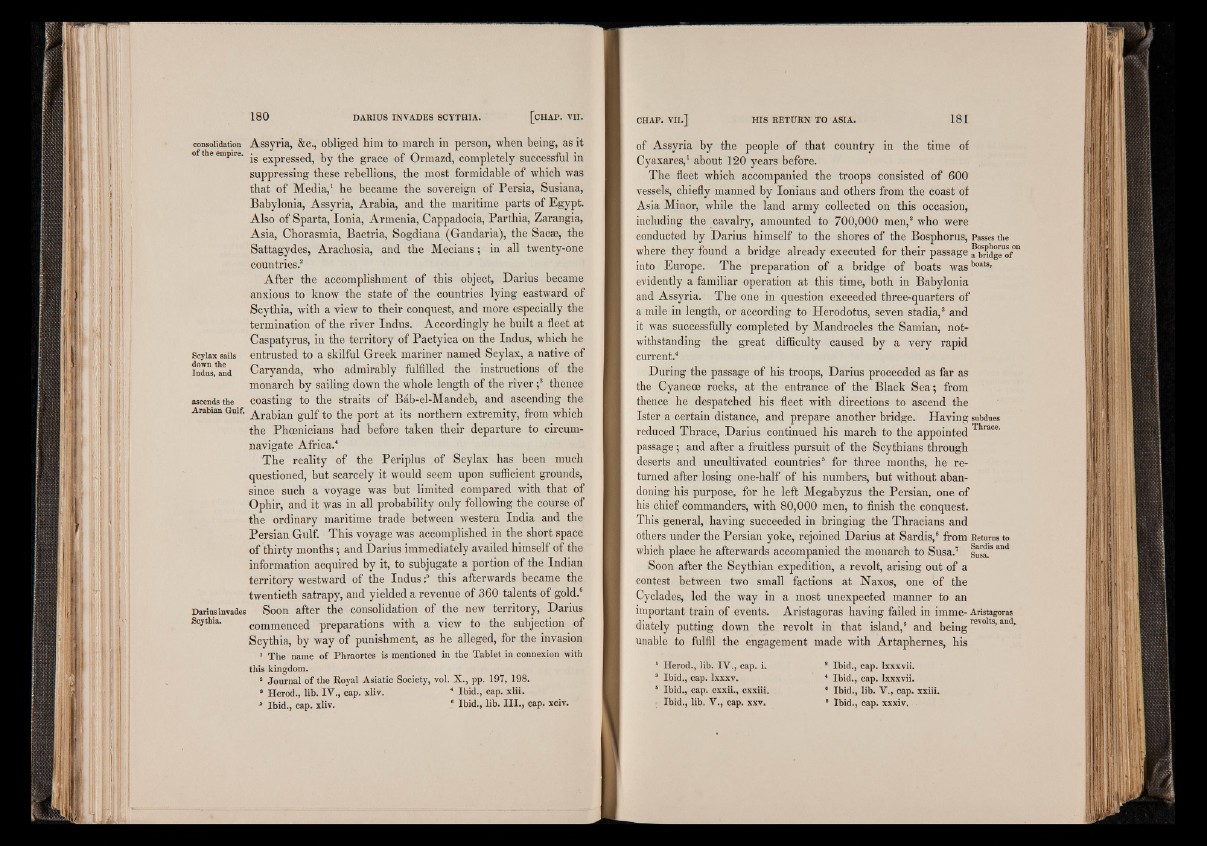
consolidation
o f the empire.
Scylax sails
down the
Indus, and
ascends the
Arabian Gulf.
Darius invades
Scythia.
Assyria, &c., obliged him to march in person, when being, as it
is expressed, by the grace of Ormazd, completely successful in
suppressing these rebellions, the most formidable of which was
that of Media,1 he became the sovereign of Persia, Susiana,
Babylonia, Assyria, Arabia, and the maritime parts of Egypt.
Also of Sparta, Ionia, Armenia, Cappadocia, Parthia, Zarangia,
Asia, Chorasmia, Bactria, Sogdiana (Gandaria), the Sacse, the
Sattagydes, Arachosia, and the Mecians; in all twenty-one
countries.®
After the accomplishment of this object, Darius became
anxious to know the state of the countries lying eastward of
Scythia, with a view to their conquest, and more especially the
termination of the river Indus. Accordingly he built a fleet at
Caspatyrus, in the territory of Pactyica on the Indus, which he
entrusted to a skilful Greek mariner named Scylax, a native of
Caryanda, who admirably fulfilled the instructions of the
monarch by sailing down the whole length of the river ;3 thence
coasting to the straits of Bab-el-Mandeb, and ascending the
Arabian gulf to the port at its northern extremity, from which
the Phoenicians had before taken their departure to circumnavigate
Africa.4
The reality of the Periplus of Scylax has been much
questioned, but scarcely it would seem upon sufficient grounds,
since such a voyage was but limited compared with that of
Ophir, and it was in all probability only following the course of
the ordinary maritime trade between western India and the
Persian Gulf. This voyage was accomplished in the short space
of thirty months; and Darius immediately availed himself of the
information acquired by it, to subjugate a portion of the Indian
territory westward of the Indus :5 this afterwards became the
twentieth satrapy, and yielded a revenue of 360 talents of gold.6
Soon after the consolidation of the new territory, Darius
commenced preparations with a view to the subjection of
Scythia, by way of punishment, as he alleged, for the invasion
1 The name of Phraortes is mentioned in the Tablet in connexion with
this kingdom.
8 Journal of the Royal Asiatic Society, vol. X., pp. 197, 198.
8 Herod., lib. IV ., cap. xliv. 4 Ibid., cap. xlii.
8 Ibid., cap. xliv. 1 Ibid., lib. I I I . , cap. xciv.
of Assyria by the people of that country in the time of
Cyaxares,1 about 120 years before.
The fleet which accompanied the troops consisted of 600
vessels, chiefly manned by Ionians and others from the coast of
Asia Minor, while the land army collected on this occasion,
including the cavalry, amounted to 700,000 men,® who were
conducted by Darius himself to the shores of the Bosphorus, Passes the
where they found a bridge already executed for their passagefbndgeof°n
into Europe. The preparation of a bridge of boats wasboats’
evidently a familiar operation at this time, both in Babylonia
and Assyria. The one in question exceeded three-quarters of
a mile in length, or according to Herodotus, seven stadia,3 and
it was successfully completed by Mandrocles the Samian, notwithstanding
the great difficulty caused by a very rapid
current.4
During the passage of his troops, Darius proceeded as far as
the Cyanece rocks, at the entrance of the Black Sea; from
thence he despatched his fleet with directions to ascend the
Ister a certain distance, and prepare another bridge. Having subdues
reduced Thrace, Darius continued his march to the appointed race‘
passage; and after a fruitless pursuit of the Scythians through
deserts and uncultivated countries5 for three months, he returned
after losing one-half of his numbers, but without abandoning
his purpose, for he left Megabyzus the Persian, one of
his chief commanders, with 80,000 men, to finish the conquest.
This general, having succeeded in bringing the Thracians and
others under the Persian yoke, rejoined Darius at Sardis,6 from Returns to
which place he afterwards accompanied the monarch to Susa.7 Susa!*&nd
Soon after the Scythian expedition, a revolt, arising out of a
contest between two small factions at Naxos, one of the
Cyclades, led the way in a most unexpected manner to an
important train of events. Aristagoras having failed in imme- Aristagoras
diately putting down the revolt in that island,8 and beingrevolts’and*
unable to fulfil the engagement made with Artaphernes, his